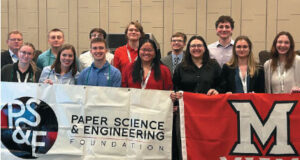MARK RUSHTON
The World BioEconomy Forum (WCBEF) event this year—held once again in Ruka, Finnish Lapland—attracted speakers and delegates from all over the globe who are working across the circular bioeconomy, from forests to recycling and from politicians and CEOs to experts in R&D. The annual WCBEF three-day event has been set up as a platform for all players in the bioeconomy to get together and share ideas.
Put simply, “the bioeconomy” is a concept by which all policy makers, commerce, industries, and businesses with renewables and recyclables at their heart are grouped together as one. Which means, of course, that the pulp and paper industry is right at the center of the concept.
The event this year was well attended by representatives from leading pulp and paper producers and suppliers, including Sappi, Valmet, Pöyry, Paptic, Navigator, Lenzing, and Sweco. Also presenting at the event were research institutions including Michigan Technological University from the US, VTT from Finland, and RISE from Sweden. In all, 22 countries were represented at the event, including speakers and delegates from Namibia, India, and Brazil.

The program included a visit to the Finnish forest.
The forum this year took on a serious tone as it is becoming more and more evident that we face a collective global problem: climate change. For the first time, the WCBEF invited an NGO to take part in the event, with Grant Rosoman of Greenpeace International appearing on the Forest Bioeconomy and Climate Change panel. Rosoman painted a pretty bleak picture of where we are currently regarding climate change. “We all know about this,” he said. “We are in a climate emergency and a biodiversity crisis with millions of hectares burning—5.2 million hectares in Russia recently, 2.5 million in Brazil and Bolivia—so we are burning up, ice is melting, sea levels are rising, there’s increasing storm intensity, as well as biodiversity being threatened with five million species being under threat. Life on this planet is under threat. Stopping deforestation is essential for the bioeconomy.”
MASSIVE OPPORTUNITIES WHILE DOING GOOD THINGS
It was clear at the event that the message of climate change is resounding on a global scale, with many presenters and delegates commenting on the changes they are seeing in their particular regions. However, instead of a doom and gloom atmosphere, there was much optimism that the forest products industries around the world are already working very hard to alleviate climate change, with production efficiencies and rafts of new sustainable products to offer the ever-aware, concerned consumers.
Berry Wiersum, CEO of Sappi Europe, agreed that opportunities are there for the pulp and paper industry to take. He said, “Climate change is forcing us companies operating in the bioeconomy into new alliances and partnerships. Innovation hasn’t been at the current level for many years; that means economic growth for our sector, and we must grab the opportunity.
“From an R&D perspective, it’s very exciting, as we can see opportunities for new materials coming from lignin and hemicellulose,” he continued. “An area where we do need to combine our thinking on is how pulp will be manufactured in the future to further reduce CO2 emissions radically.”
Nicholas Oksanen, executive vice president and head of the Process Industries Division at Pöyry, took part in the CEO panel. “The new bio-based solutions in the process industry sectors are innovating and developing widely toward commercial solutions to replace fossil-based materials. Plastic substitution is creating new markets and demand for the whole forest products sector,” said Oksanen. “Overall, the value chain is changing as more and more side and waste streams are utilized as raw materials or new products. The target is to reduce the amount of waste to zero.”
FIRM DECLARATIONS
The Ruka event ended with some firm declarations that bioeconomy stakeholders took home with them, including:
• To manage the bioeconomy with a particular view to the health of the planet as the No.1 priority;
• To ensure that the circular bioeconomy is economically sustainable;
• To agree, wherever possible, to use the bioeconomy to create jobs for rural and urban communities;
• To share knowledge and best practices between North, South, East and West.
Jukka Kantola, founder and chairman of the WCBEF, said, “We were delighted with this years’ forum. This shows that the circular bioeconomy is attracting more interest among stakeholders from all over the world and also shows that the circular bioeconomy is a vital tool in the mitigation of climate change.”
The 2020 event has been set for September 9-11 and will once again be held in Ruka, Finland. Updates will be posted at http://
www.wcbef.com.
 Paper 360
Paper 360


